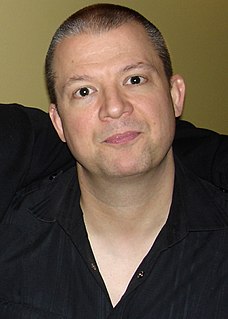A Quote by Timothy Keller
I've heard plenty of Christians try to answer the why question by going back to the what. "You have to believe because Jesus is the Son of God." But that's answering the why with more what. Increasingly we live in a time in which you can't avoid the why question. Just giving the what (for example, a vivid gospel presentation) worked in the days when the cultural institutions created an environment in which Christianity just felt true or at least honorable. But in a post-Christendom society, in the marketplace of ideas, you have to explain why this is true, or people will just dismiss it.
Quote Topics
Answer
Answering
Avoid
Back
Because
Believe
Christendom
Christianity
Christians
Created
Cultural
Days
Dismiss
Environment
Example
Explain
Felt
For Example
Giving
God
Going
Gospel
Heard
Honorable
Ideas
Increasingly
Institutions
Jesus
Just
Least
Live
Marketplace
More
People
Plenty
Post
Presentation
Question
Society
Son
Time
True
Try
Vivid
Which
Why
Will
Worked
Related Quotes
When I decided to write about my brother and friends, I was attempting to answer the question why. Why did they all die like that? Why so many of them? Why so close together? Why were they all so young? Why, especially, in the kinds of places where we are from? Why would they all die back to back to back to back? I feel like I was writing my way towards an answer in the memoir.
This crazy little party girl who loves to enjoy life actually has a purpose. So, that's really the core of why I've survived so many years and I can go and I can fall down and I can get back up. Why? Because I know why I'm here. That's the question that a lot of people need to answer when they do fall is, 'Why am I here?' If you can answer that question, you'll be able to dust yourself off and shine like a phoenix out of ashes.
Well, years and years ago, I started to ask myself three very simple questions, which dominated my life for many years. One of them was, "Why are organizations everywhere, whether commercial, social, or religious, increasingly unable to manage their affairs?" The second question was, "Why are individuals throughout the world increasingly in conflict with and alienated from the organizations of which they're a part?" And the third was, "Why are society and the biosphere increasingly in disarray?"
So the main question is not, Which humans brought about the death of Jesus but, What did the death of Jesus bring about for humans - including Jews and Muslims and Buddhists and Hindus and nonreligious secularists - and all people everywhere?When it is all said and done, the most crucial question is: Why? Why did Christ suffer and die? Not why in the sense of cause, but why in the sense of purpose?
If you have a little inteligence, sooner or later the question is bound to arise: What is the point of it all? Why? It is impossible to avoid the question for long. And if you are very intelligent, it is always there, persistently there, hammering on your heart for the answer: Give me the answer! - Why?
Science tries to answer the question: "How?" How do cells act in the body? How do you design an airplane that will fly faster thansound? How is a molecule of insulin constructed? Religion, by contrast, tries to answer the question: "Why?" Why was man created? Why ought I to tell the truth? Why must there be sorrow or pain or death? Science attempts to analyze how things and people and animals behave; it has no concern whether this behavior is good or bad, is purposeful or not. But religion is precisely the quest for such answers: whether an act is right or wrong, good or bad, and why.
This is not just a simple story of "money can't buy happiness." Or maybe that's just what it is. And if it is, why shouldn't it be? Because if this is something we are already supposed to know, then why don't we know it? Why do we chase and scrabble and fight for things to flaunt, why? Why do we reach for power over other people, and through the thin superiority of our possessions, believe we have it? Why do we let money make people bigger, and allow those without it to be made smaller? How did we lose the truth in the frantic, tribal drumbeat of more, more, more?
The key question isn't "What fosters creativity?" But why in God's name isn't everyone creative? Where was the human potential lost? How was it crippled? I think therefore a good question might not be why do people create? But why do people not create or innovate? We have got to abandon that sense of amazement in the face of creativity, as if it were a miracle that anybody created anything.
['John F. Kennedy] movie is based on a massive best-selling book, which is always helpful. And then the script was amazing and answered my question, "Why this? Why now?" And the "why now" is that it's 50 years since the assassination, and the country needs to have and will have a conversation about that. And the "why this" is the construct, which I think is sort of ingenious.
The question we should be asking is not why people are sometimes cruel, or even why a few people are usually cruel (all evidence suggests true sadists are an extremely small proportion of the population overall), but how we have come to create institutions that encourage such behavior and that suggest cruel people are in some ways admirable-or at least as deserving of sympathy as those they push around.



































